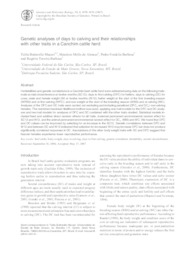Genetic analyses of days to calving and their relationships with other traits in a Canchim cattle herd.
Genetic analyses of days to calving and their relationships with other traits in a Canchim cattle herd.
Author(s): MUCARI, T. B.; ALENCAR, M. M. de; BARBOSA, P. F.; BARBOSA, R. T.
Summary: Heritabilities and genetic correlations in a Canchim beef cattle herd were estimated using data on the following traits: male scrotal circumference at twelve months (SC12); days to first calving (DFC) for heifers; days to calving (DC) for cows; male and female weight (W) at twelve months (W12); heifer weight at the start of the first breeding season (WFBS) and at first calving (WFC); and cow weight at the start of the breeding season (WBS) and at calving (WC). Analyses of the DFC and DC traits were carried out excluding and including penalized (DFCP and DCP) non-calving females. The restricted maximum likelihood method was used, applying one-trait models for the DFC and DC analyses and two-trait models for analyses of DFC and DC combined with the other traits studied. Statistical models included fixed and additive direct random effects for all traits, maternal permanent environmental random effect for SC12 and W12, and the animal permanent environmental random effect for DCP, WBS and WC. We found that DFC and DC values can be improved by selecting for an increase in the SC12. Genetic correlations between DFC and W12 and between DC and W12 indicated that selection for increased W12 may increase DFC but does not produce significantly correlated responses in DC. Associations of the other body weight traits with DC and DFC suggest that heavier females experience lower reproductive performance.
Publication year: 2007
Types of publication: Journal article
Observation
Some of Embrapa's publications are published as ePub files. To read them, use or download one of the following free software options to your computer or mobile device. Android: Google Play Books; IOS: iBooks; Windows and Linux: Calibre.
Access other publications
Access the Agricultural Research Database (BDPA) to consult Embrapa's full library collection and records.
Visit Embrapa Bookstore to purchase books and other publications sold by Embrapa.

